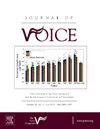A Comparative and Correlational Study of the Vocal Fatigue Index (VFI) and the Voice Fatigue Handicap Questionnaire (VFHQ) in Individuals with and without Voice Disorders
IF 2.5
4区 医学
Q1 AUDIOLOGY & SPEECH-LANGUAGE PATHOLOGY
引用次数: 0
Abstract
Objectives
The aim of this study was to examine the difference and correlation between the Vocal Fatigue Index (VFI) and the Voice Fatigue Handicap Questionnaire (VFHQ) among individuals with and without voice disorders.
Study design
Observational study.
Methods
This study was performed from June to December 2021. A total of 308 people were enrolled, including 72 men and 236 women. Questionnaire scores were obtained for both the VFI and the VFHQ. The Mann–Whitney U test and Spearman correlational analysis were used to analyze the data.
Results
Of the 308 participants, 186 had a voice disorder and 122 did not. The most common voice disorders were chronic laryngitis and vocal fold polyps. The VFI and VFHQ scores differed between groups with and without voice disorders and between men and women. The VFHQ total score correlated significantly with all subscale scores of the VFHQ and with the VFI factor scores.
Conclusions
People with voice disorders have significantly worse voice-related quality of life and more severe vocal fatigue symptoms than those without. The scores on the VFI and VFHQ correlate significantly.
嗓音疲劳指数(VFI)和嗓音疲劳障碍问卷(VFHQ)在嗓音疾病患者和非嗓音疾病患者中的比较和相关性研究。
研究目的本研究旨在探讨嗓音疲劳指数(VFI)和嗓音疲劳障碍问卷(VFHQ)在有嗓音障碍者和无嗓音障碍者中的差异和相关性:研究设计:观察性研究:研究时间:2021 年 6 月至 12 月。共有 308 人参加了研究,其中男性 72 人,女性 236 人。获得了 VFI 和 VFHQ 的问卷分数。数据分析采用 Mann-Whitney U 检验和 Spearman 相关分析:在 308 名参与者中,186 人有嗓音障碍,122 人没有。最常见的嗓音疾病是慢性喉炎和声带息肉。嗓音失调组和非嗓音失调组之间以及男性和女性之间的 VFI 和 VFHQ 分数存在差异。VFHQ总分与VFHQ的所有分量表得分以及VFI因子得分有显著相关性:结论:与没有嗓音疾病的人相比,有嗓音疾病的人与嗓音相关的生活质量明显更差,发声疲劳症状也更严重。VFI 和 VFHQ 的得分有显著相关性。
本文章由计算机程序翻译,如有差异,请以英文原文为准。
求助全文
约1分钟内获得全文
求助全文
来源期刊

Journal of Voice
医学-耳鼻喉科学
CiteScore
4.00
自引率
13.60%
发文量
395
审稿时长
59 days
期刊介绍:
The Journal of Voice is widely regarded as the world''s premiere journal for voice medicine and research. This peer-reviewed publication is listed in Index Medicus and is indexed by the Institute for Scientific Information. The journal contains articles written by experts throughout the world on all topics in voice sciences, voice medicine and surgery, and speech-language pathologists'' management of voice-related problems. The journal includes clinical articles, clinical research, and laboratory research. Members of the Foundation receive the journal as a benefit of membership.
 求助内容:
求助内容: 应助结果提醒方式:
应助结果提醒方式:


